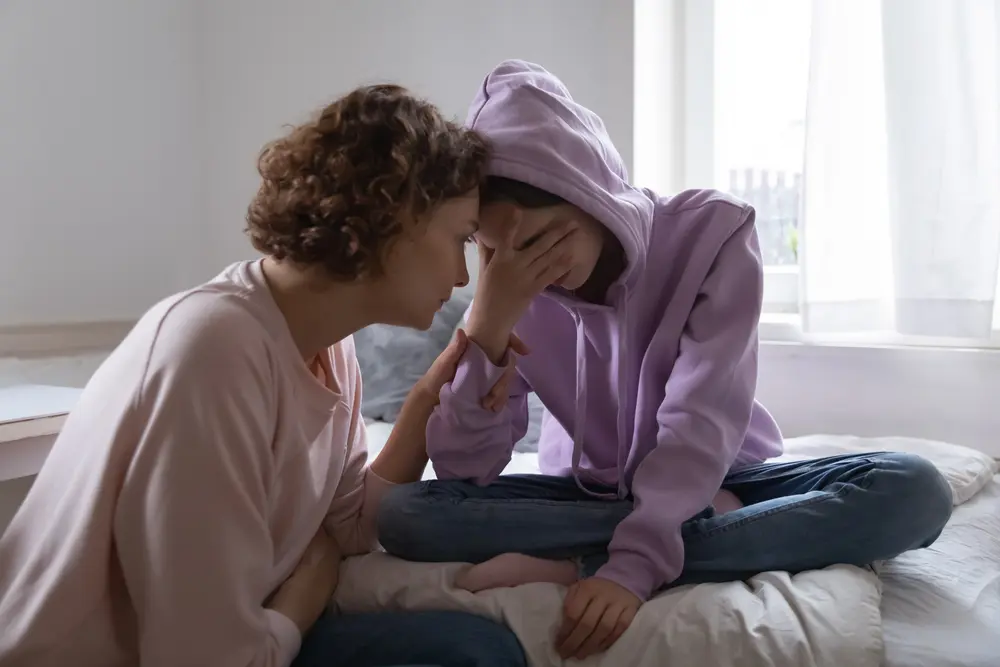How to Help A Kind Who Feels Left Out & Ostracized By Their Friends

I often get heartbreaking emails from parents who are feeling helpless as they watch their child experience the pain of being left out and ostracized from their friend group. The pain of rejection runs so deep.
One parent shared how her third grader approached several groups to play, but wasn’t allowed to join.
Another shared how her son approached a table of kids and was told that he could not sit with them, yet later on he was asked to help them in a group project.
And still another shared that her daughter tried out for the school cherub choir only to be left out of the after party invitations after their holiday performance.
I’m happy to say as painful as this is to watch as a parent, there is a silver lining. If your child is coming to you and saying they are being left out – that is so much easier to handle than the child who denies there is a problem.
This article is for all of the well-intentioned parents who want to help their kids when they feel rejected, left out, excluded, ostracized and otherwise ignored by their peers. This is excruciating to watch because it’s heartbreaking. But, there are things you can do and I will show you a few that work well for my students and my own kids too.
First, How Does Feeling Left Out Show Up At Home?
When your child comes home from school and starts to share about their “miserable day,” your job is to listen. Try not to fix before you really hear what’s going on. One of the biggest parenting hacks is to simply observe what’s happening, and in the case of your kid being left out, you’ll hear their feelings and experience in detail if you merely let them share.
First, observe their tone
A snappy tone or refusal to talk is always a clue that something went amiss during the day. If your child runs to their room avoiding the conversation about their day, remember that one day doesn’t indicate a pattern. Here you want to listen over several days so you get a sense of something actually being different than their normal behavior.
Some kids need time to sort through what’s happening emotionally and it’s not uncommon to not want to talk about it. But, if this pattern is truly present and different from their normal way of sharing about their day at school, then it’s time to ask some deeper questions.
Next, observe their behavior
Behavioral changes like sleeplessness, increased moodiness or increased up and down mood changes are signs that something is “on their mind” and interrupting their ability to manage their feelings.
You may also see physical signs like a change in their eating patterns or in how they want to spend their time. If your child changes from asking to spend time with friends, to “I need more downtime,” this is a signal that something potentially with those friends is amiss.
Finally, listen to their words
If your previously “chatty” child changed into a “mopping” or “brooding” person overnight, listen to what they’re saying when they do talk to you. Telling you that “no one gets together in person” or “birthday parties are for babies” and then informing you how you don’t understand, is a message in and of itself.
Equally, refusing to discuss anything about friendship is a sign your kid is lonely.
Let’s face it we all love spending time with our kids, but you don’t want to be their best pal, their every Saturday night movie buddy. You want them to have other people in their lives, building memories. When your kid doesn’t get asked to birthday parties, asked on play-dates and doesn’t hang out with more than one kid this often means they don’t have cafeteria pals, people to partner with and other kids to share time with and build relationships with.
These are all signals to you that your kid is not happy and has something going on that needs to be explored.
The good news is that all of this can change. Often kids don’t have the skills they need to figure out the social game and we can help them build those skills.
Is Ostracizing a Form of Bullying?
Lots of people ask me this and here’s the truth, sometimes it is, and sometimes it isn’t. Technically, socially rejecting, excluding and ostracizing others is a form of bullying called relational aggression.
Relational aggression happens more often in middle school and it’s even common for adults in the workplace. It takes the form of cyber-bullying, shaming, excluding, ostracizing, gossiping, spreading rumors, public humiliation and peer pressure.
Dealing with this kind of bullying can be very difficult for kids and their parents. Many, if not most of the victims, suffer in silence. And if they have a history of struggling to make friends and connections, it can be exacerbated.
But, Being Left Out Isn’t Always Bullying Or Relational Aggression.
In some cases, yes this is at the root of what’s going on. But, in other cases and more commonly, kids don’t have the social skills to make friends. They simply don’t know where or how to get started. This is especially true for kids with social anxiety, ADHD or other social barriers that prevent them from feeling safe or comfortable knowing how to play easily with others.
The bridge from saying “hi” to meeting up and walking to Starbucks together is a chasm too far. Some kids retreat because they just don’t know how and that is embarrassing and upsetting. Kids who have these feelings often take them out on the ones closest to them simply because it’s safe to release their painful feelings in your direction.
So, all the surface things they do – yelling at you, sarcasm, snappy tones and even constant arguing are because they are not happy. And they need our help to figure out how to meet other kids.
How To Help When Your Child Feels Left Out
Below are ten things you can do as a parent to help your child. Some you may have already tried, that’s OK. Practice is good when it comes to supporting your child. If you have other ideas, please share them with our community in the comments section below.
Listen
If you are lucky enough to have a kid who confides in you, take the time to listen. Resist the urge to jump in and fix things; sometimes just being heard is all they need.
Gather Information
Try to find out key pieces of intel from teachers, coaches and siblings to understand where your child gets off track and what they need to do to change. Maybe they pick the wrong friends, maybe they are too needy. All this is hard to hear but it’s important to understand the current social landscape.
Speak Out
Bring your concerns to a teacher, recess monitors, bus drivers, or administrators so you gain a deeper perspective on what’s happening in the child’s life outside of your home. If there’s evidence of some kind of bullying behavior, talk through the channels available to you at school and when you can, reach out to the parent of the child or teen whose behavior is concerning. The sooner the situation is addressed, the higher the likelihood that the behavior will go away, or at least be lessened. Be sure to use a calm tone when addressing the issues as problem solving calls for a collaboration.
Find Special Interest Activities
Using special interest as a key centerpiece to help your child is a wonderful pathway for neurodivergent children and teens to find like minded peers. It’s easier to bond and find common ground in a club, activity where they share interests. Brainstorm with your child to find those key interests. If they need to start online to gain confidence they can then transition to in person activities.
Be in a “Practice” Mindset
These skills will not develop overnight. If your child enters these new activities in a practice and skill building mindset with smaller goals then she is less likely to feel the pressure to perform. This is trial and error. Pick key skills they are working on and have them work to warm up, notice the scene using Social Spy and try to chat with other kids about shared interests.
Set Up A Game Plan With Your Child Now Vs. Later
If you have a clear idea of what’s going on, it’s unwise to delay acting on it. These things don’t often “resolve themselves” as much as we wish they would. Don’t be surprised if you experience some resistance from your child either. It’s uncomfortable to try new things when the fear of rejection is high.
Unfortunately, kids can be insensitive about welcoming new kids in. So, work with your child on what he or she can do to have the best experience making new friends. Role playing is a great way to practice approaching new friends on the playground or asking to sit with kids at lunch.
Have a few scripts worked out with a few “get-to-know-you” questions and that will make it easier for everyone.
Ideas that can work well include: “What did you do this weekend?” or “What book are you reading?” or “What did you think of X (something the teacher said, or something that happened in class that day)?”
Talk Openly About Your Challenges Making Friends
Social skills don’t come easy to everyone, and practicing social smarts is a skill we can all learn with time and practice. It’s important that your child feels bonded with you, instead of like they’re “in trouble” for not being able to make friends like “everyone else.” If you have stories of your own to share, that often helps.
Remind Your Child That This Isn’t Their Fault
Sometimes, things like being left out happen not because of anyone intending to be mean, but that doesn’t mean there aren’t hurt feelings along the way. Help your child understand that they aren’t to blame for other people’s behavior.
Finally, Pay Attention To Their Wins
Celebrate with your child when they hurdle the obstacles in front of them. It’s not easy to make friends especially after a time of feeling left out and ignored. When you ask your child about their day at school, make a point to also ask what they did on the playground and at lunch time. If they have stories to tell, listen and then praise their efforts to connect with new friends.
The truth is that when a kid feels left out, especially when you can see it yourself, it’s not an easy thing to overcome. Kids can be harsh in their criticism and sometimes it takes lots of practice to work with your child to learn the skills of friendship. Those are the building blocks of being liked and accepted by their peers.
This isn’t to say that your child needs to succumb to peer pressure or changing their personality to be accepted. Lots of “out of the box” kids make lifelong friends in school. What appears to be more important is learning how to be a good friend. And in this area the skills of listening, participating and contributing go a long way.
In my book Why Will No One Play With Me, I offer lots of tools to help parents. My latest research has brought to life Social Spy and you can read more about it here, or watch my TedX Talk on Social Spy to hear more about how it works.
What To Do If None Of This Works
If your kid continues to be ostracized or bullied even after implementing these recommendations, consider counseling to help them express their feelings and learn healthy coping skills. Have them evaluated by a doctor if you notice signs of depression. Contact the National Suicide Prevention Lifeline at 988 for support and assistance from a trained counselor if your child is having suicidal thoughts. If they are in immediate danger, call 911.These tips are meant to be easy wins for parents and their kids.
I hope you’ll give them a try.
Updated: 3/2/23




